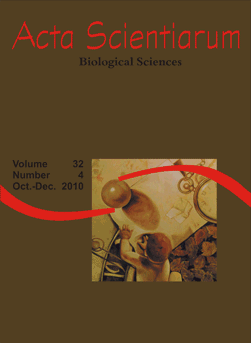<b>Cell death induced by tamoxifen in human blood lymphocytes cultivated <em>in vitro</em></b> - doi: 10.4025/actascibiolsci.v32i4.7015
Resumo
Many chemotherapeutic agents with a potential against solid tumors or leukemia can cause lymphopenia. Tamoxifen (TAM) is a synthetic non-steroidal anti-estrogen drug employed in female breast cancer treatment. The present study investigated the capacity of TAM to induce cell death in human lymphocytes cultivated in vitro. Lymphocytes were obtained from young (25-30 years; n = 3) and elderly women (58-77 years; n = 3) and cultivated for 24 or 48h, with or without TAM (20 µM). After the culture, cell viability, immunocytochemical response and ultrastructure were evaluated. TAM affected lymphocytes in a time- dependent manner, and cells obtained from elderly women were the most sensitive to TAM. Immunocytochemical analysis evidenced higher frequency of apoptosis in treated cells, and the ultrastructural study revealed autophagic vacuoles, differing from the controls. In summary, the treated lymphocytes were affected by TAM, leading to cell death by apoptosis and autophagy.Downloads
DECLARAÇÃO DE ORIGINALIDADE E DIREITOS AUTORAIS
Declaro que o presente artigo é original, não tendo sido submetido à publicação em qualquer outro periódico nacional ou internacional, quer seja em parte ou em sua totalidade.
Os direitos autorais pertencem exclusivamente aos autores. Os direitos de licenciamento utilizados pelo periódico é a licença Creative Commons Attribution 4.0 (CC BY 4.0): são permitidos o compartilhamento (cópia e distribuição do material em qualqer meio ou formato) e adaptação (remix, transformação e criação de material a partir do conteúdo assim licenciado para quaisquer fins, inclusive comerciais.
Recomenda-se a leitura desse link para maiores informações sobre o tema: fornecimento de créditos e referências de forma correta, entre outros detalhes cruciais para uso adequado do material licenciado.













1.png)




3.png)













